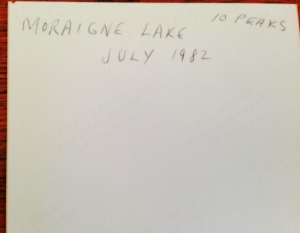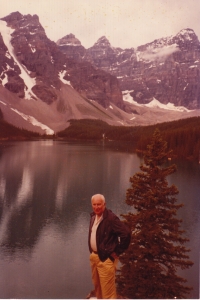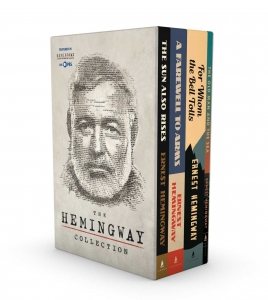 As a writer, I’ve had multiple run-ins with Ernest Hemingway. The first was in the spring of 2021, following the airing of the Ken Burns documentary, and the most recent was last month, after buying a large Hemingway boxed-set, which I wolfed down in two weeks. The set included The Sun Also Rises, and A Farewell to Arms, which I had previously tried to read all the way through and failed.
As a writer, I’ve had multiple run-ins with Ernest Hemingway. The first was in the spring of 2021, following the airing of the Ken Burns documentary, and the most recent was last month, after buying a large Hemingway boxed-set, which I wolfed down in two weeks. The set included The Sun Also Rises, and A Farewell to Arms, which I had previously tried to read all the way through and failed.
This time I did not fail. But perhaps I should have. You see, for the past year I have been completing a novel that has its stylistic roots in what I like to think of as “modern gothic” with what I hope is fluid and frankly beautiful prose. My work tends to come from a much different aesthetic place than those who follow the Hemingway method, i.e., Raymond Carver, Tobias Wolff, and George Saunders; yet to my chagrin I found, as I pressed through the great and tragic author’s oeuvre I was losing my sense of self, my sense of who I am as a writer. There are some writers, and artists in other fields, whose voice and style are so magnetic, so enveloping, that they instill in the reader or viewer the sense of nothing having existed before or after them. Hemingway is a quintessential example of this, and an author whom most aspiring writers need to tangle with at some point. And for me, this past month, my collision with Hemingway came, and I left the ring, as it were, feeling as if I’d been continually punched in the face. This could be due to the quick, jabbing, declarative nature of Hemingway’s prose—it stands to reason that he himself was an avid boxer—and clearly brought this quality into even his most lengthy, involved novels such as A Farewell to Arms and For Whom the Bell Tolls.
Some writers—I’d even say most—try a different approach with the reader. Some lull, some soothe, and some entertain. Hemingway does none of the above. Hemingway berates and belittles, but he also rescues and redeems. Which is why, even when I recently felt his voice becoming my own, and my boundaries yielding to his force of will, I did not put his books down, did not shunt my new boxed-set onto a high shelf, did not flee the ring. I stood firm. I withstood. I, and most importantly, my young novel survived.
***
I work with fiction writers almost every day, as an editor and a literary representative. Most of the time I think half of my job is to help each writer tangle with the demons embedded in their prose, thorny eruptions that can spring up at any moment. In even more poetic terms, I see myself as a Horatio, Hamlet’s loyal friend, who stands fast as the ghost of his father the fallen confronts the young prince and forces him to wrestle with his conscience. On the page we come face to face with ourselves, and when we read books we come face to face with other people. Naturally every writer, when working in the most effective capacity, will bring themselves to the page, so it stands to reason that when one reads Hemingway they not only read him, they face him, and sometimes even face off with him.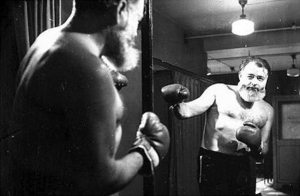
If you’ll allow one more boxing metaphor, when we pick up, say, A Farewell to Arms, we are contending with an experience that Hemingway has transmuted to the page in terms as stark as he could muster. He dares you to withstand him and what he experienced. You feel like you are slogging through the mud, feel like you are tangling through the trenches, and when Henry’s dear love Catherine Barkley dies in childbirth he makes you go through it with him, mourning her to the last page as he denies us even a smidgen of satisfaction. “After a while I went out and left the hospital and walked back to the hotel in the rain.” Henry does not cry. He does not scream. He simply stumbles on, injured and broken, just as we, having made it to page 332 stumble on.
I know all this sounds like I don’t like Hemingway very much. Quite the contrary—I love him. But it is precisely this love, this agony of inspiration, that writers must learn how to handle. When I was younger it was easy to read a page or two of A Moveable Feast and think, okay this is how it’s done, and immediately run to the computer or a notebook and put down a litany of irredeemably declarative sentences. Now that I am a bit older, this doesn’t happen as readily, and I am able, perhaps because of my sense of self—fragile though it continues to be—to manage it, and am able to cross the tightrope of influence and homage.
As Rainer Maria Rilke posited in Letters to a Young Poet an artist must work with whatever is only theirs, and no one else’s. This sounds easy enough, and yet it is probably one of the hardest things a writer can do, and maybe the biggest accomplishment next to putting a period on the final sentence of a great work. How does one withstand, to use a word I’ve deployed already too often, the gravitational pull of someone so monumentally important to our culture and still have faith and confidence in what they’re offering a reader? I know I used the second person when posing that question, but I am talking about myself as much as others. How was I supposed to let my own novel live when Hemingway had seemingly dashed apart my style with a few choice sentences? The word “confident” kept flooding back to my mind, because the way he comes across on the page is as someone who is so utterly convinced of his literary excellence and aesthetic brilliance that anything less—or more importantly, different—is exactly that, less.
But I am here to say: this is false. Though his confidence, even certainty in his style, made him the great writer we know him as, it does not mean other possible fictive valences are worthless, or worth less than his own. When analyzed further, how could it possibly be the only way? A signature of life is its diversity and essential uniqueness. Human beings are varied, not only in terms of race and creed, but also in personality, and yes, style. One writer cannot define the entirety of the canon, no matter how hard they try, or people try for them.
***
But again, I love Hemingway. And I also love what I am working on—you must. This may sound conceited, or foolhardy, but I think loving the pages on your desk is essential to those pages finding an audience and living. I believe a literary figure like Hemingway must be seen in the context of his times, for today, due to his lack of preamble and exposition, he might not have made it out of the pages of minor publications. But in the same way, do we judge Wilt Chamberlain, the only professional basketball player ever to score 100 points in a single game, by the standards of excellence in the current NBA? We do not.
This is all to say that ideas about the greatest writer or the greatest style are inconclusive. I firmly believe anyone, regardless of ultimate success, when they put pen to paper—or fingers to keyboard—are trying to put down the greatest sentence ever. No one enters this field with dreams of mediocrity. We slip into the ring bravely, and work with what we have, with what is most accessible; eventually, if we are lucky, we eschew all influence and find that now vague concept: our voice, that which comes solely from ourselves. We may have influences. We may have shadings in our work that relate or are in conversation with those who came before, but at heart our best work is apt to come when we are in touch with our innermost quality of command, our innermost narrative, our personal dreams. Hemingway had his dreams. And we have ours. But I suspect we will continue to box with him, and writers of all styles, backgrounds, and understandings, until this experiment ends—and let’s hope it never will.
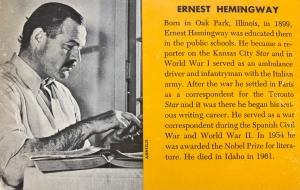
M. G. Turner
June 2022
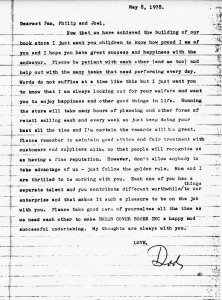 My father, Earl I. Turner (Feb 7, 1918-July 8, 1992), was a dear man who showed me so much about being a kind and decent person. Here’s a letter he wrote for his three children on May 8, 1978, four days after we’d opened Undercover Books, our bookstore in Shaker Heights, Ohio. Jewish tradition embraces the idea that a parent may offer to their children what’s termed an “ethical will,” which is pretty much what he gave us here, with its discussion of ethics in business, while standing up for one’s self. The photograph was taken on a visit he made to the Canadian Rockies in 1982, a sightseeing journey that he gloried in. My own enjoyment of gorgeous scenic views was no doubt inspired by him. His handwriting and signature were very distinctive, and I’m always comforted when I see his script on something, as here. Thank you, Dad, gone thirty years, love for you always.
My father, Earl I. Turner (Feb 7, 1918-July 8, 1992), was a dear man who showed me so much about being a kind and decent person. Here’s a letter he wrote for his three children on May 8, 1978, four days after we’d opened Undercover Books, our bookstore in Shaker Heights, Ohio. Jewish tradition embraces the idea that a parent may offer to their children what’s termed an “ethical will,” which is pretty much what he gave us here, with its discussion of ethics in business, while standing up for one’s self. The photograph was taken on a visit he made to the Canadian Rockies in 1982, a sightseeing journey that he gloried in. My own enjoyment of gorgeous scenic views was no doubt inspired by him. His handwriting and signature were very distinctive, and I’m always comforted when I see his script on something, as here. Thank you, Dad, gone thirty years, love for you always. 